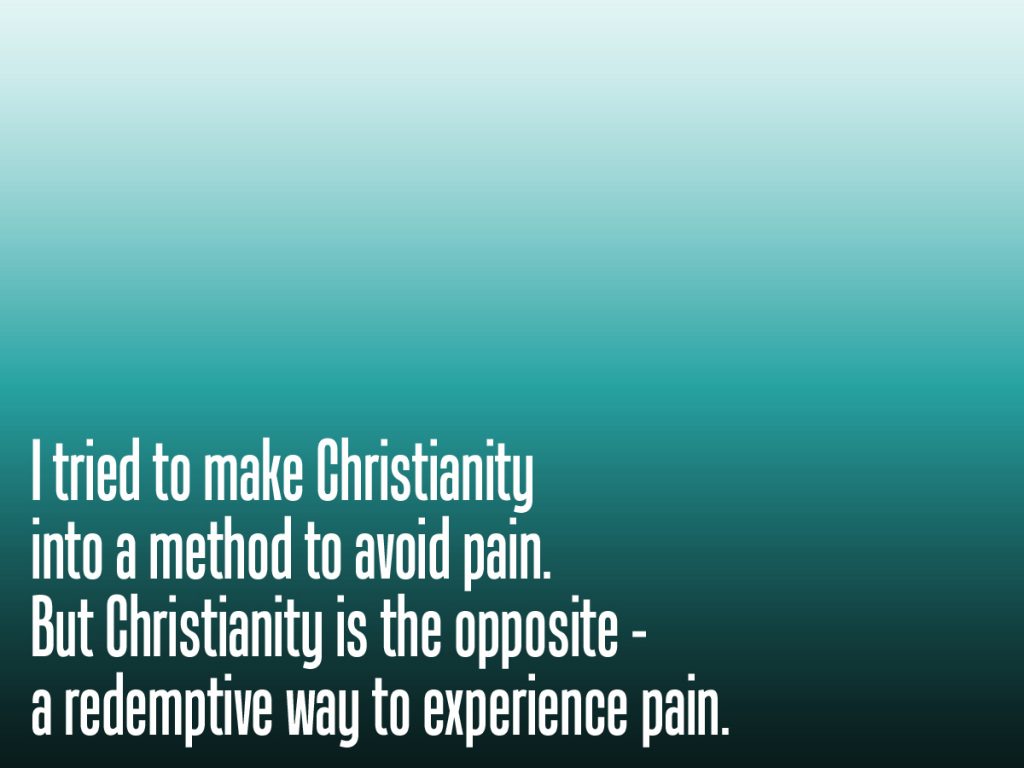Acquainted With Grief

No one taught me how to grieve. In my college fellowship years, it wasn’t a part of my discipleship program. I don’t remember a single talk or Bible study on the subject. I wouldn’t have been interested anyway. My goal, unstated as it was, was to avoid loss. At least, I believed that if I were Christian enough – then I wouldn’t feel losses.
That is a ludicrous statement, of course. That’s why I left it unstated. But I pursued it nonetheless. I saw the Christian life as a way to be above sadness (or any ill-feeling). I viewed all negative feelings as either sinful or unnecessary. I saw some negative emotions as sinful (bitterness, jealousy), some that could go either way (anger, desire for justice) and some were in the middle (hurt, grief). But I categorized them all the same – they feel bad and therefore were to be avoided.
My “unstated” philosophy has been a problem for me:
When I was socially exiled in middle school – how could I grow honest without hurting?
When I was betrayed in college – how could I be true to my own heart without suffering?
When I lost a stillborn child – how could I remember him without feeling empty arms?
When I face an aging face in the mirror – how can I accept myself without feeling loss?
Look at the underlined phrases in the sentences above. If I won’t tell the truth about a fallen world (i.e. – if I won’t grieve) – then I forfeit honesty, my own heart, attachment to my children, and the acceptance of myself. In short – if I won’t grieve fully – then I won’t live fully.
My avoidance of grief meant that I avoided my life. The cost to “not feel” is very high. You lose your experience. Eventually, as you become more detached, you lose the ability to experience the bittersweet and then the sweet. You lose your life, trying to gain it.
When I was young, I somehow got Christianity backwards. I thought the resurrection meant that I don’t have to face death. But the resurrection means that I can face death. I tried to make Christianity into a method to avoid pain. But Christianity is the opposite – a redemptive way to experience pain. Christianity is a way to die.
Christianity turns things upside down. Instead of full (and futile) flight from the reality of loss and death – we face it (and call it what it is) because we believe in the resurrection. Because of the resurrection, we can have the courage to tell the truth about loss and death. We grieve, not because we don’t have hope, but because we do.
 Roger Edwards joined The Barnabas Center in 1991. In addition to counseling individuals & couples, Roger teaches & leads discussion groups about applying the Bible to everyday life. He is a licensed professional counselor, holds a master’s degree in biblical counseling from Grace Theological Seminary in Indiana & earned a bachelor’s degree in engineering from UNCC. He is married to Jean, and they have seven children.
Roger Edwards joined The Barnabas Center in 1991. In addition to counseling individuals & couples, Roger teaches & leads discussion groups about applying the Bible to everyday life. He is a licensed professional counselor, holds a master’s degree in biblical counseling from Grace Theological Seminary in Indiana & earned a bachelor’s degree in engineering from UNCC. He is married to Jean, and they have seven children.







2 comments
Thank you for your transparency in sharing your own struggles with grief, and for so aptly summarizing thoughts on “dealing honestly” with the bittersweetness found in the hard times of life.
This article reinforces so much that God has been doing in my life already, and is a real encouragement to keep trusting Him.
grieving with Hope,
Mark
Profound! In nursing school, I wrote my senior paper
On “How the Emotions Affect the Fetus”: never knew
Until age 60 that my parents were “upset” about being
Pregnant with me on board during their engaged time before
Marriage. They thought about aborting me, until deciding they
Wanted children. But I had a shame I used to feel as a kid, a self
Hate, a feeling of not being good enough. This info explained alot
Of why I even chose that subject as a Term paper topic, unbeknownst
To me at the time of my own parents thinking, but my In Womb Emotions
Knew it & Felt it! & it matters to God that we be Healed!